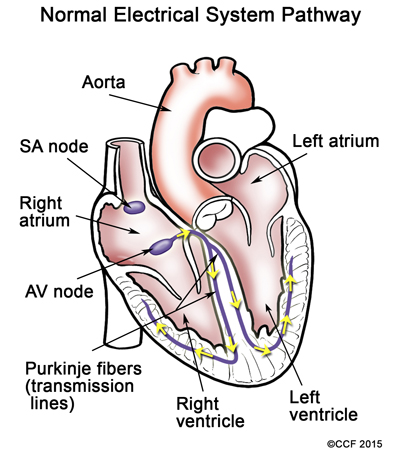Arrhythmia is an irregular heartbeat. In a child with arrhythmia, the heart may beat too quickly, beat too slowly, skip a beat or have extra beats. Most types of irregular heartbeat in children are harmless. And most go away with treatment of the underlying cause, such as fever or infection. But some types can be serious.
Advertisement
Cleveland Clinic is a non-profit academic medical center. Advertising on our site helps support our mission. We do not endorse non-Cleveland Clinic products or services. Policy

Image content: This image is available to view online.
View image online (https://my.clevelandclinic.org/-/scassets/images/org/health/articles/14788-pediatric-arrhythmias.ashx)
An arrhythmia is any change in your heart’s regular, even rhythm. Children can have an arrhythmia — an irregular heartbeat — just like adults.
Advertisement
Cleveland Clinic is a non-profit academic medical center. Advertising on our site helps support our mission. We do not endorse non-Cleveland Clinic products or services. Policy
This might mean that your child’s heart beats too quickly, beats too slowly, skips a beat or has extra beats. It often doesn’t require treatment, but some cases can be serious.
Your heart has a special electrical system that regulates its rate and rhythm:
Your heart has a predictable rate and rhythm when this process works properly. But arrhythmia occurs if something interrupts the electrical conduction system of your heart.
Arrhythmias are common in children and usually harmless. In rare cases, the condition can be serious or even life-threatening.
Advertisement
There are many types of irregular heart rhythms in children, as there are in adults.
Many start in their atria (upper chambers of their heart). We refer to these as supraventricular tachycardia (SVT). There are different types of SVT as listed below:
Some types of arrhythmias are related to the ventricles (two lower chambers of the heart):
Other types of arrhythmia include:
Sinus arrhythmia is a misleading phrase. Although it’s a variation in the heartbeat, it’s normal and occurs in all children to some degree. It’s a sign of good heart health.
Sinus arrhythmia in children means they have a faster heartbeat when inhaling and a slower one when exhaling. It doesn’t cause symptoms or require treatment.
The symptoms of irregular heartbeat in kids vary widely and depend on what type of arrhythmia they have. Your child may experience:
Advertisement
In rare cases, the first symptom may be a seizure, syncope or sudden cardiac death.
Most children with SVT have no underlying structural heart issues. For other types of arrhythmias, many factors can cause arrhythmia in children, including:
Providers often detect arrhythmia during a routine checkup or during diagnosis or treatment for another health condition. You can also ask your healthcare provider about the symptoms if you suspect your child has an arrhythmia.
Your pediatrician or a pediatric cardiologist will ask about your child’s health history and your family’s medical history. They’ll listen to your child’s heart and determine whether they need any tests. These may include:
Advertisement
Rarely, your doctor may recommend a monitor called a loop recorder. Your provider makes a small cut in the skin on your child’s chest and implants the monitor under their skin. This monitor may be helpful when other tests don’t provide clear answers.
Advertisement
Some cases of arrhythmia don’t need treatment. Your provider may recommend monitoring your child’s heart over time.
In other situations, your child’s healthcare provider may treat the underlying cause of their arrhythmia. If your child has an infection, for example, your provider may prescribe antibacterial or antiviral medications. Similarly, if your child has a chemical imbalance, certain medications can help restore balance and resolve arrhythmia.
Your provider may recommend antiarrhythmic medications like beta-blockers or calcium channel blockers. These regulate heartbeats by slowing electrical impulses.
A child with a more serious case of arrhythmia may need a procedure to correct it, like:
The outlook for a child with arrhythmia varies widely. Most arrhythmias in kids are harmless and don’t have long-term health effects. Some children outgrow an irregular heartbeat. Others continue to have arrhythmia but can live normal lives without treatment.
Even serious arrhythmias can be treated successfully.
Rarely, untreated cases of serious arrhythmia can cause severe consequences, including:
Generally, there’s no way to prevent arrhythmia. But if you or your child notice that certain activities trigger arrhythmia, you can avoid doing those things. For example, if certain intense exercises prompt arrhythmia episodes, perhaps you can find other, less intense ways for your child to be active.
If your child experiences arrhythmia symptoms, the following strategies may help:
Consider asking your provider the following questions if your child is diagnosed with arrhythmia:
Arrhythmia can make your child’s heart race, beat too slowly or feel like it skips a beat. It’s natural to worry if your child has any unusual heart symptoms. But most arrhythmias are harmless in children, and many kids grow out of them. Talk to your pediatrician to learn more about your child’s heart health.

Sign up for our Health Essentials emails for expert guidance on nutrition, fitness, sleep, skin care and more.
Learn more about the Health Library and our editorial process.
Cleveland Clinic’s health articles are based on evidence-backed information and review by medical professionals to ensure accuracy, reliability and up-to-date clinical standards.
Cleveland Clinic’s health articles are based on evidence-backed information and review by medical professionals to ensure accuracy, reliability and up-to-date clinical standards.
When your heart rhythm is out of sync, the experts at Cleveland Clinic can find out why. We offer personalized care for all types of arrhythmias.
